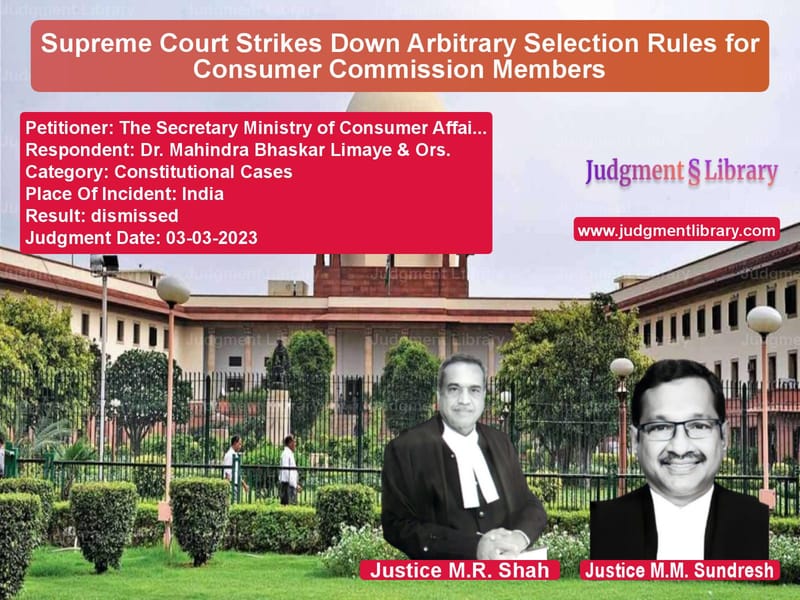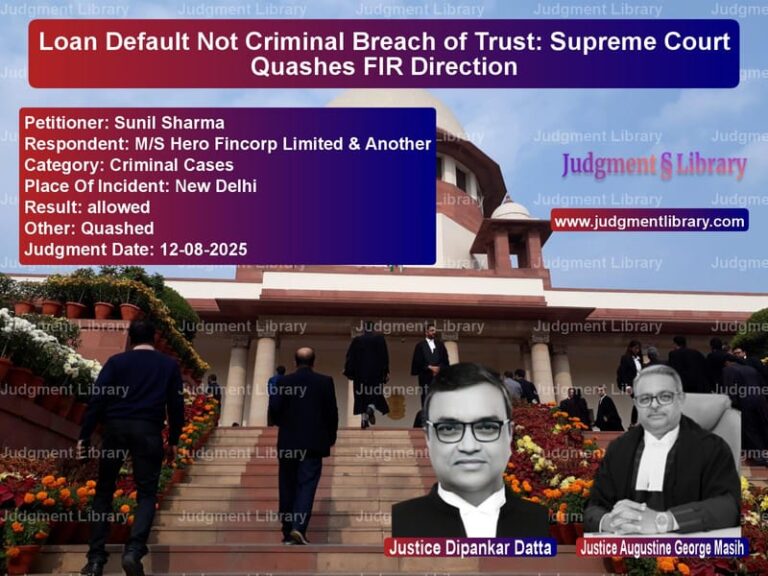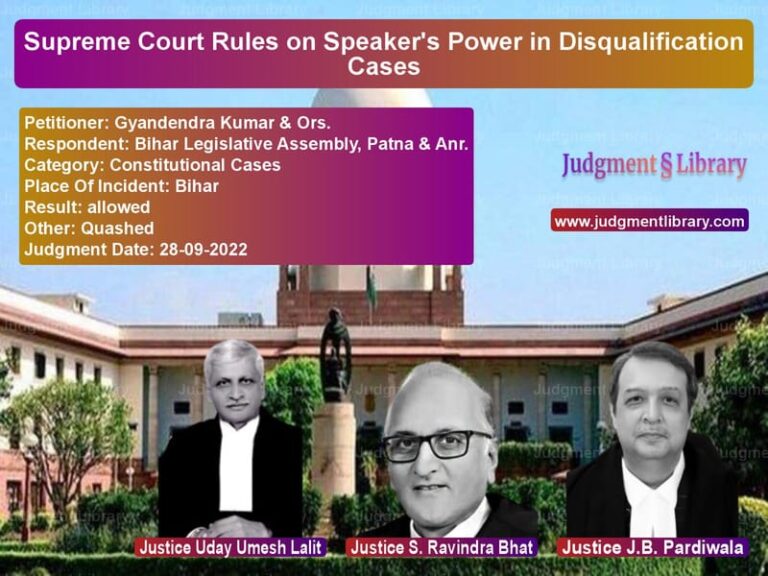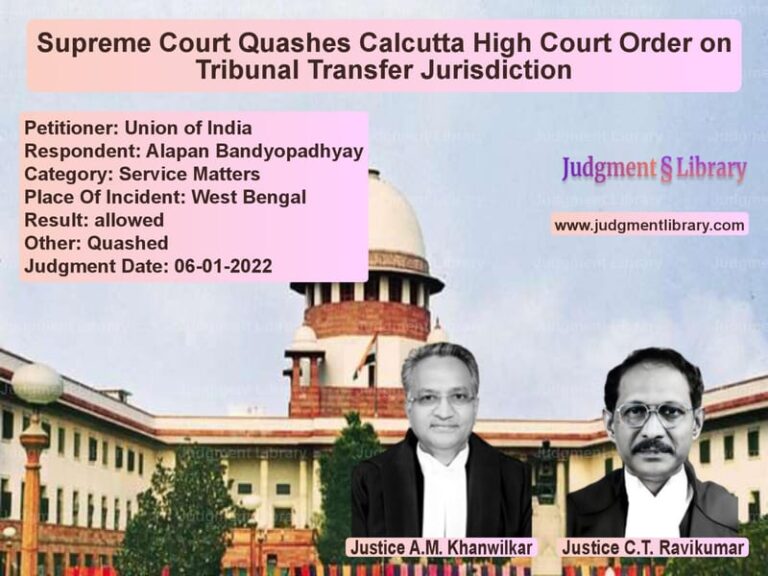Supreme Court Strikes Down Arbitrary Selection Rules for Consumer Commission Members
The case of The Secretary Ministry of Consumer Affairs v. Dr. Mahindra Bhaskar Limaye & Ors. is a landmark ruling that addresses the appointment process for members of the State and District Consumer Commissions. The Supreme Court examined whether the rules framed under the Consumer Protection Act, 2019, for appointing members to these commissions were arbitrary, unreasonable, and violative of Article 14 of the Constitution of India.
In its judgment, the Supreme Court upheld the decision of the Bombay High Court, which struck down Rule 3(2)(b), Rule 4(2)(c), and Rule 6(9) of the Consumer Protection (Qualification for Appointment, Method of Recruitment, Procedure of Appointment, Term of Office, Resignation, and Removal of President and Members of State Commission and District Commission) Rules, 2020. The Court ruled that the rules granted excessive discretionary powers to the Selection Committee and failed to ensure transparency and merit-based appointments.
Background of the Case
The case arose from a challenge to the 2020 rules governing the appointment of members to Consumer Commissions. The key provisions under scrutiny included:
- Rule 3(2)(b): Required a person to have a minimum of 20 years of experience in fields such as law, public affairs, economics, or medicine to be eligible for appointment as a member of the State Commission.
- Rule 4(2)(c): Mandated a minimum of 15 years of experience for appointment as a member of the District Commission.
- Rule 6(9): Granted the Selection Committee unchecked discretion in determining the procedure for recommending candidates.
Arguments by the Parties
Arguments by the Petitioners (The Secretary Ministry of Consumer Affairs)
- The government argued that the rules were intended to ensure that only experienced and qualified individuals were appointed to Consumer Commissions.
- They contended that members of these commissions perform quasi-judicial functions and should have substantial experience in consumer affairs and other relevant fields.
- The discretion granted to the Selection Committee was necessary to maintain flexibility in choosing suitable candidates.
Arguments by the Respondents (Dr. Mahindra Bhaskar Limaye & Others)
- The respondents contended that the rules were arbitrary and violated Article 14 of the Constitution.
- They argued that the requirement of 20 years of experience for State Commission members and 15 years for District Commission members was excessive and unjustified.
- They pointed out that similar judicial roles, such as District Judges, required only seven years of legal experience, making the experience criteria in the 2020 rules irrational.
- They emphasized that the Selection Committee’s unchecked discretion created a risk of political and bureaucratic interference in the appointment process.
Supreme Court’s Legal Analysis
Constitutional Validity of Rule 3(2)(b) and Rule 4(2)(c)
The Supreme Court held that the requirement of 20 years and 15 years of experience for appointment to the State and District Commissions, respectively, was arbitrary and unreasonable. The Court observed:
“A lawyer with seven years of practice can be appointed as a District Judge, and a lawyer with ten years of practice can be appointed as a High Court Judge. It is irrational to demand 20 years of experience for Consumer Commission members.”
Excessive Discretion Under Rule 6(9)
The Court criticized the lack of transparency in the Selection Committee’s procedure and noted that unchecked discretion could lead to favoritism and political interference. It stated:
“The absence of objective criteria for selecting members allows arbitrary appointments, undermining the integrity of the Consumer Commissions.”
Need for a Written Examination
The Supreme Court referred to its earlier decision in UP Consumer Protection Bar Association v. State of Uttar Pradesh, where it emphasized the importance of merit-based selection. It ruled that appointments to Consumer Commissions should be based on a written examination and interview to ensure transparency and competence.
Final Judgment by the Supreme Court
The Supreme Court ruled:
- Rule 3(2)(b) (20-year experience requirement) was struck down.
- Rule 4(2)(c) (15-year experience requirement) was struck down.
- Rule 6(9) (discretionary selection process) was struck down.
- The Court directed the government to amend the rules to provide for a merit-based selection process.
- Future appointments must be based on a written examination (200 marks) and viva voce (50 marks).
Impact of the Judgment
- Ensures merit-based appointments: The ruling mandates objective criteria for selecting Consumer Commission members.
- Prevents political interference: Eliminating discretionary power reduces the risk of favoritism in appointments.
- Strengthens consumer rights: Qualified and competent members will enhance the efficiency of Consumer Commissions.
- Aligns selection criteria with judicial standards: The experience requirements are now in line with judicial appointments.
Conclusion
The Supreme Court’s decision in The Secretary Ministry of Consumer Affairs v. Dr. Mahindra Bhaskar Limaye & Ors. marks a significant step in ensuring transparency and accountability in the appointment of Consumer Commission members. By striking down arbitrary rules and mandating a merit-based selection process, the ruling strengthens consumer protection and upholds the principles of fairness and justice in tribunal appointments.
Petitioner Name: The Secretary Ministry of Consumer Affairs.Respondent Name: Dr. Mahindra Bhaskar Limaye & Ors..Judgment By: Justice M.R. Shah, Justice M.M. Sundresh.Place Of Incident: India.Judgment Date: 03-03-2023.
Don’t miss out on the full details! Download the complete judgment in PDF format below and gain valuable insights instantly!
Download Judgment: the-secretary-minist-vs-dr.-mahindra-bhaskar-supreme-court-of-india-judgment-dated-03-03-2023.pdf
Directly Download Judgment: Directly download this Judgment
See all petitions in Fundamental Rights
See all petitions in Public Interest Litigation
See all petitions in Judgment by Mukeshkumar Rasikbhai Shah
See all petitions in Judgment by M.M. Sundresh
See all petitions in dismissed
See all petitions in supreme court of India judgments March 2023
See all petitions in 2023 judgments
See all posts in Constitutional Cases Category
See all allowed petitions in Constitutional Cases Category
See all Dismissed petitions in Constitutional Cases Category
See all partially allowed petitions in Constitutional Cases Category







